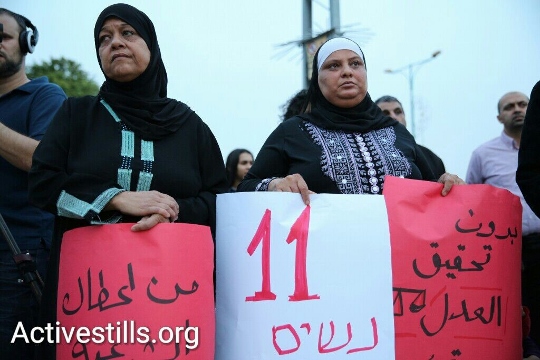We must challenge masculinity that derives its power from the backs of the weakest segments in our society, while at the same time proposing an alternative masculinity that fights back against our humiliation.
By Abed Abu Shehadeh

After every catastrophe that befalls Arab society in Israel, I find myself typing away. I write to try and describe and analyze political events, focusing specifically on mechanisms of oppression. Time after time I ask myself why I even write in the first place, when I am well aware of the fact that I am using rationalistic tools to analyze irrational events. After all, there is no logic in oppression, beyond the fact that people develop these systems to control others and maintain their privileges. When we show oppressors the facts about the way they oppress, they will do everything in their power to explain it away using all kids of excuses. As long as they don’t need to take responsibility or change the existing balance of power.
And yet, despite the frustration and feeling of helplessness when it comes to dealing with violence in Arab society, writing about murders — and specifically the murder of Arab women — is a duty. Every article, every post on Facebook, even if only those who are already convinced read them, can have an effect. We must write with the hope that these words prevent the next catastrophe.
I prefer not to focus on the facts having to do with recent murders, and instead will focus on the question of Arab masculinity. I do not write about femininity, nor do I try to explain the behavior of women, for two reasons; first, far be it from me as a man to preach to women over who they are or what they need to be. They know to do this far better than I do. The second resin is that there is very little writing surrounding Arab masculinity.
After all, there is something completely illogical in the fact that Arab men were occupied by a foreign entity and undergo a lifetimes worth of humiliation by state institutions, while accepting the situation as a given — and ostensibly without having their ego bruised. On the other hand, despite the danger of lengthy imprisonment and strict prohibitions in both Islam and Christianity against violence and murder — the phenomenon of violence against women not only continues, it is getting worse.
In order to gain a deeper understanding, one must understand the psychological crises that men undergo when they internalize oppression, often causing them to try and control those weaker than them in order to prove their masculinity. That is, at the same time that the Arab man faces a racist legal system that discriminates against him, there developed a cultural legal system that maintains his power according to his family ties, his socio-economic class, his religious affiliation, and the very fact that he is a man. And although one can sit at the top of the pyramid in Arab society, at the end of the day, it is clear that the Jewish man holds most of the power and resources in Israel.
Frantz Fanon, in his famous book, Black Skin, White Masks, argued that: “Despite the danger that I may enrage my black brothers, I wish to say that the black man is not a man.” It is with this argument that I want to engage — not in the chauvinistic sense, but in the humanistic one — to argue that the Arab is not a man as long as he accepts humiliation by the system and refuses to confront it. The time has come that we challenge masculinity that derives its power from the backs of the weakest in our society, while at the same time presenting an alternative masculinity that cares for the weak.
It is worrying to see our leaders ignore the fact that many young Arabs view criminals as heroes and role models. This admiration was not created in a vacuum, it is the mirror image of a chauvinistic masculinity that works against the weak. Criminality is an ideal example for understanding chauvinistic masculinity – men who enrich themselves through crime against Arab society itself, leaving over 2,000 Arab youths dead since 2000. Thus, the new masculinity that we must develop needs to be based on compassion and worry for Arab society, while at the same time rejecting the internalization of our national oppression by Jewish Israeli men. This new masculinity will confront any form of oppression in order to prove it is worth its while, in order to solve all our psychological crises, and to bring back our dignity.
French philosopher Blaise Pascal once said that: “It is right that what is just should be obeyed; it is necessary that what is strongest should be obeyed.” Unfortunately, this banal sentence explains human behavior; there are things we do because they are right and just, and there are things we do because there is a system — whether legal, cultural, or social — that compels us to act a certain way. Adopting a humanistic male identity will undoubtedly challenge the entire Arab system. Changing the way we think about ourselves, which will be expressed in love for our society and resisting Israel’s humiliating oppression — is, in my eyes, the most right and just thing we can do.
Abed Abu Shehadeh is a Balad Party member and a student at the School of Government and Society of Tel Aviv-Yaffo Academic College. This article was first published in Hebrew on Haokets.

